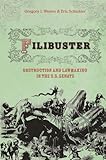Filibuster : obstruction and lawmaking in the U.S. Senate / Gregory J. Wawro and Eric Schickler.
Material type: TextSeries: Publication details: Princeton, New Jersey : Princeton University Press, (c)2006.Description: 1 online resource (326 pages)Content type:
TextSeries: Publication details: Princeton, New Jersey : Princeton University Press, (c)2006.Description: 1 online resource (326 pages)Content type: - text
- computer
- online resource
- 9780691134062
- Obstruction and lawmaking in the U.S. Senate
- United States. Congress. Senate -- Freedom of debate
- United States. Congress. Senate -- Cloture
- United States. Congress. Senate -- Rules and practice
- États-Unis. Congress. Senate -- Règlements et procédure
- États-Unis. Congress. Senate -- Liberté de parole
- Filibusters (Political science) -- United States
- JK1161 .F555 2006
- COPYRIGHT NOT covered - Click this link to request copyright permission: https://lib.ciu.edu/copyright-request-form
| Item type | Current library | Collection | Call number | URL | Status | Date due | Barcode | |
|---|---|---|---|---|---|---|---|---|
 Online Book (LOGIN USING YOUR MY CIU LOGIN AND PASSWORD)
Online Book (LOGIN USING YOUR MY CIU LOGIN AND PASSWORD)
|
G. Allen Fleece Library ONLINE | Non-fiction | JK1161 (Browse shelf(Opens below)) | Link to resource | Available | ocn868980417 |
Includes bibliographies and index.
Obstruction in theoretical context -- The mutability of senate rules -- Where's the pivot? -- Dilatory motions and the success of obstruction -- Obstruction and the tariff -- Slavery and obstruction in the antebellum senate -- Obstruction and institutional change -- Cloture reform reconsidered -- The impact of cloture on the appropriations process.
Parliamentary obstruction, popularly known as the 'filibuster, ' has been a defining feature of the U.S. Senate throughout its history. In this book, Wawro and Schickler explain how the Senate managed to satisfy its lawmaking role during the 19th and early 20th century, when it lacked seemingly essential formal rules for governing debate. What prevented the Senate from self-destructing during this time? The authors argue that in a system where filibusters played out as wars of attrition, the threat of rule changes prevented the institution from devolving into parliamentary chaos. They show that institutional patterns of behavior induced by inherited rules did not render Senate rules immune from fundamental changes. The authors' theoretical arguments are supported through a combination of extensive quantitative and case-study analysis, which spans a broad swath of history. They consider how changes in the larger institutional and political context--such as the expansion of the country and the move to direct election of senators--led to changes in the Senate regarding debate rules. They further investigate the impact these changes had on the functioning of the Senate. The book concludes with a discussion relating battles over obstruction in the Senate's past to recent conflicts over judicial nominations.--Book jacket flap.
COPYRIGHT NOT covered - Click this link to request copyright permission:
There are no comments on this title.
